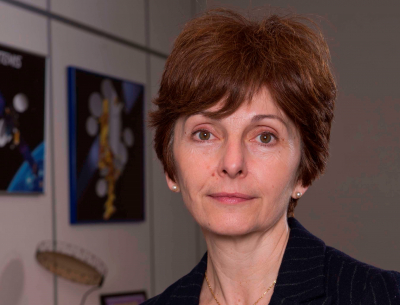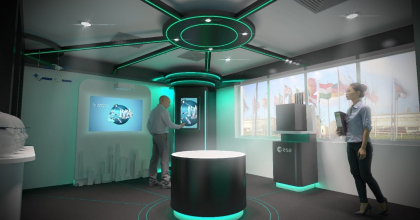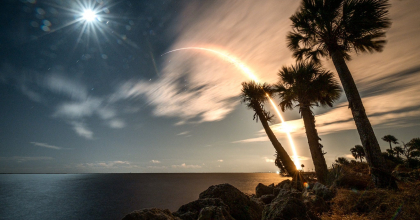After 12 years as director of Telecommunications and Integrated Applications (TIA) and 7 years as head of the European Centre for Space Applications and Telecommunications (ECSAT), Magali Vaissiere will be retiring from ESA at the end of August. during her time here, Magali has been instrumental in the formation of ECSAT and has led ESA’s initiatives supporting the competitiveness of European and Canadian industry in the worldwide commercial telecommunications market. this includes the development of new technologies and working practices, and the incorporation of space assets into new commercially sustainable products and services.
The first woman to be appointed head of a technical department at ESA, Magali also received the prestigious “Prix Irène Joliot-Curie” from the French Ministry of Higher Education and Research in Paris in 2007, and was selected by Forbes as one of the Europe's Top 50 Women In Technology in 2018.

Reflecting on her time at ESA, we asked Magali about her career as Director of TIA, and about what the future may have in store.
What would you say was your greatest achievement as Director of TIA?
From my perspective, my greatest achievement is to have been able to expand the scope, the size and the relevance to the market of ESA activities in the field of telecommunications and downstream applications.
Today, ESA is active in the development of new technology and products in both space and ground segments, new satellite based systems including constellations, new applications and services. ESA is partnering with hundreds of companies, prime manufacturers, equipment suppliers, operators, both large and small service providers and even start-ups, in the upstream as well as downstream sectors.
ESA is now recognised as an important player in the market. This has been possible only because I have been supported by a great team, in terms of varied skills and experience, high performance and motivation. Of course, I include in that great team all the colleagues from the other Directorates who have supported us. I am very grateful to all of them and I am very proud of what we could achieve together.
As Head of ECSAT, what’s it been like seeing the site and Harwell Campus evolve over the past few years?
The development of ECSAT has been both a big challenge for me (and for ESA) and a fabulous personal experience. There again, I am very pleased and proud of what we have achieved, in particular thanks to a strong cooperation with the UK delegation and UK Space Agency. The challenges were numerous: to develop a centre with 100 people in 3 years, to be recognised as a prominent player on the Harwell Campus and the UK in general, to overcome the political anxiety created by the Brexit debate and eventually become the only ESA Centre in a non-EU country.
The Campus has grown extensively and new buildings are mushrooming. The ECSAT infrastructure is also growing, which will enhance the international visibility of ECSAT and of the Harwell Campus. I feel personally very attached to each and every person at ECSAT since I know them individually. A large majority of people at ECSAT are TIA colleagues, but there are also colleagues from other directorates (EOP, HRE, TEC, HIF, IPL) and I have very much enjoyed all the multi-disciplinary activities that we were able to develop.
What does the future of ESA look like to you?
Space has become more and more strategic and global. The number of institutional and private organisations active in space keep growing. ESA is one of these organisations, yet a very important one in Europe and for a number of institutional partners.
I am not able to gaze into a crystal ball but I am convinced that the future of ESA will be very much linked to the ability of ESA to adapt and reinvent its role in the various segments of space activities. So indeed there are still be a lot of interesting developments and challenges for ESA and its people.
What are your plans for the future?
First, I will have to learn to distance myself from work and the space domain and define a new balance in my life where the time spent with my family and friends will become my new priority.
In the future, I will also be interested by some specific functions which will keep me close to Research and Development organisations, although not necessarily focused on space.
Is there anything else you’d like to add or a message that you'd like to share with colleagues?
I feel very privileged for the career I have had, first in industry and then at ESA .
I have worked hard with the full support of my family and I have enjoyed every day of my tenure at ESA working with my team, with other colleagues of ESA and the delegations. I wish to thank them all.
A heartfelt thank you to Magali for all the tireless work and great achievements at ESA. You will be missed! We wish you all the best for the future.




